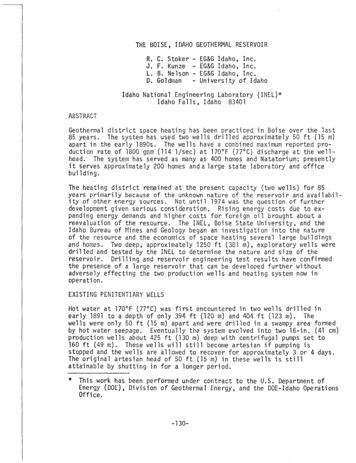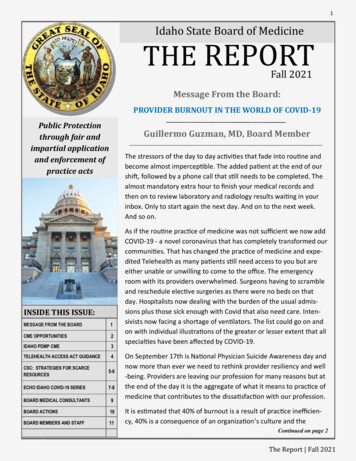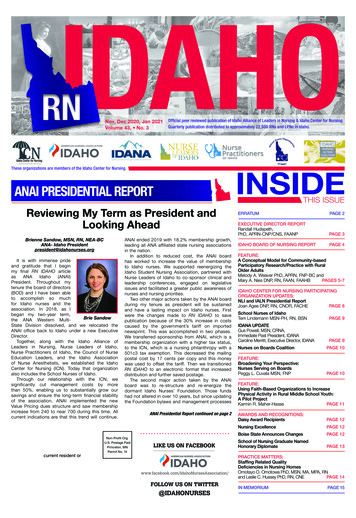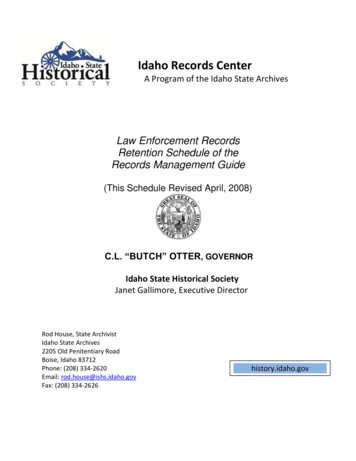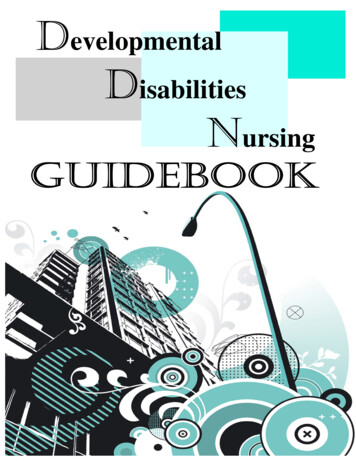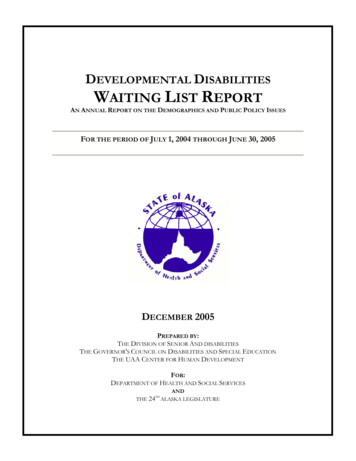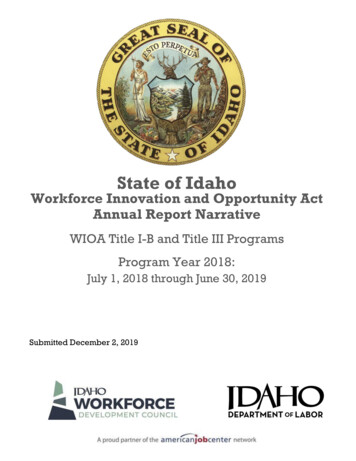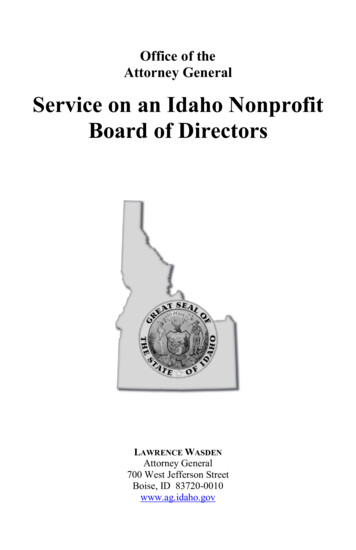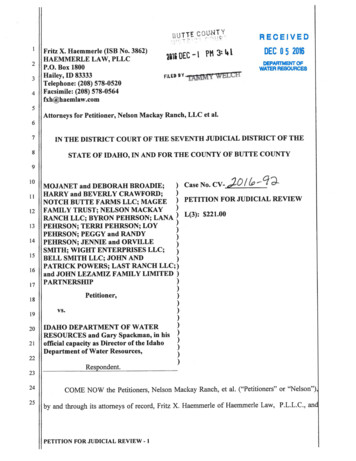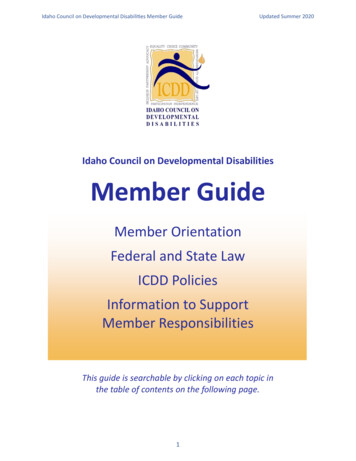
Transcription
Idaho Council on Developmental Disabili es Member GuideUpdated Summer 2020Idaho Council on Developmental DisabilitiesMember GuideMember OrientationFederal and State LawICDD PoliciesInformation to SupportMember ResponsibilitiesThis guide is searchable by clicking on each topic inthe table of contents on the following page.1
Idaho Council on Developmental Disabili es Member GuideUpdated Summer 2020ContentsWelcome to the Idaho Council on Developmental Disabili es! . 3Authority for the Council . 4Principles of the DD Act . 4Purpose of the DD Act. 5Working on Goals for Change . 6Five Year Strategic Plan . 7Who Is on the Council? . 8Council Member Responsibili es . 9Policy Governance . 10Council Officers . 11Council Groups. 11Council Opera ons. 12Council Staff . 14Council Budgets . 15Where the Council Fits in State Government . 17Where the Council Fits in Federal Government . 18Links to Addi onal Informa on . 19State Law . 20ICDD Policies . 28Council Budget – Overview . 40Conflict of Interest . 44Cultural Competence . 47Council Member Responsibili es and Community Rela onships . 49Legisla ve Ac on Recommenda ons: Se ng Priori es for Legisla ve Issues . 51AIDD Guidance on Informing Policymakers . 53Defini on of Developmental Disability. 55Basics of Parliamentary Procedure . 56Acronyms . 58Appendix - Forms . 672
Idaho Council on Developmental Disabili es Member GuideUpdated Summer 2020Welcome to the Idaho Councilon Developmental Disabili es!VISION:All Idahoans participate as equal members of society,empowered to reach their full potentialas responsible and contributing citizens of their communities.MISSION:Promote the capacity of people with developmental disabili es andtheir families to determine, access and direct the services and/orsupport they need to live the lives they choose, and to build thecommunity’s ability to support their choices.PURPOSE:To make sure that people with developmental disabili esand their families help design the services they use and can get thesupport they need to live a full life included in their community.FUNCTION:To work in many different ways to improve systems and programsso they are centered around the individual and familyand provide the services and supports people needto be self-determined in their lives.VALUES:Inclusion. Partnership. Advocacy. Equality. Choice. Community.Responsibility. Independence. Par cipa on. Quality of Life.3
Idaho Council on Developmental Disabili es Member GuideUpdated Summer 2020Authority for the CouncilCouncils were created in 1963 and are authorized by federal law:the Developmental Disabilities Assistance and Bill of Rights Act.There are 56 Councils located in every state and U.S. territory.The Idaho Council was established in 1978.We Celebrate 42 Years this Year!The Idaho Council is also authorized in state law:The Idaho Council on Developmental Disabilities Act.Idaho Statute Title 67-Chapter 67.The law includes language that states the Council must be free to act withoutinterference from any entity. This allows the Council the freedom to do its jobwithout undue influence from any person, group, or agency.Principles of the DD ActIndependenceTo have controlProductivityTo work or make other contributions to a household or a communityIntegrationRight to the same opportunities, services, and community resources as all other AmericansInclusionTo fully participate, be welcome in social, educational, and work activitiesand community life4
Idaho Council on Developmental Disabili es Member GuideUpdated Summer 2020Purpose of the DD ActThe purpose of the Act is to provide for federal funding to support State Councilson Developmental Disabili es to:1. engage in advocacy, capacity building, and systemic change ac vi es2. contribute to a system of community services that is person centered andincludes individualized supports for each person who needs them so peoplemay be independent, produc ve and included in their community.Councils are required by law to engage in:AdvocacySpeaking with and for people with intellectual anddevelopmental disabili es and their families andproviding opportuni es to help them learn and prac cespeaking out for themselves.Capacity BuildingIncreasing the amount of and access to services that peoplewith intellectual and developmental disabili es need.Systems ChangeWorking with people with intellectual and developmentaldisabili es to create needed services and the way in whichthey are provided so people with intellectual anddevelopmental disabili es have more independence,inclusion and par cipa on in their communi es. Workingwith policymakers to change laws and rules when necessary.5
Idaho Council on Developmental Disabili es Member GuideUpdated Summer 2020Working on Goals for ChangeCouncils are given powerful direc on and broad authority to set priori es in theirindividual states by the DD Act. Councils work toward public policies thatpromote several goals for people with developmental disabili es, including: Self Determina on - ac vi es that result in individuals with developmentaldisabili es having the ability and opportunity to communicate and makepersonal decisions, exercise control over the type and intensity of supportsand services they receive, the authority to control resources, opportuni esto par cipate in and contribute to their communi es, and support toadvocate for themselves and others. Inclusion - acceptance and encouragement of the presence andpar cipa on of individuals with developmental disabili es, by individualswithout disabili es, in social, educa onal, work, and community ac vi es. Integra on - exercise of the equal right of individuals with developmentaldisabili es to access and use the same community resources as areavailable to and used by other individualsCommunity NOW! Stakeholder Collaborative Workgroup6
Idaho Council on Developmental Disabili es Member GuideUpdated Summer 2020Five Year Strategic PlanThe Council’s Plan: Is the ‘big picture’ of how services and programs for individuals withdevelopmental disabili es and their families should be five years from now Provides direc on to the Council about how it spends its resources Iden fies barriers to be overcome or changes that need to be made Includes long term goals to be accomplished within five years Includes measurable outcomes that the Councilreports to the Administra on on Intellectual andDevelopmental Disabili es (AIDD)Developing Goals and Desired OutcomesEvery five years, as required by our federal law, the Council gathers informa on frompeople with disabili es, their families, service providers, public agencies and otherorganiza ons to determine what the Council's ac on agenda should be for the nextfive years. This informa on is provided to Council members who, with help fromstaff, develop goals and outcomes. Then staff recommend the ac vi es needed toaccomplish them. This plan must be submited to the Administra on on Intellectualand Developmental Disabili es for approval. Our next 5-year plan (2022-2026) willbe developed over the next 18 months and is due August 15, 2021.Each year, the Council creates an annual work plan that outlines the work we willdo toward mee ng our five-year plan goals. Any amendments (new informa on)the Council makes to goals or objec ves that changes the meaning of a goal in its5-year plan must be sent to AIDD by August 15th of that year. Otherwise theannual plan is due in December.Reporting ProgressEach December, the Council must submit a Program Performance Report (PPR) toAIDD about the progress the Council has made toward achieving the goals in itsplan during the past federal fiscal year.7
Idaho Council on Developmental Disabili es Member GuideUpdated Summer 2020Who Is on the Council?The Council is comprised of 23 members. Representa on is from the following: People with developmental disabili es (6) Family members of people with developmental disabili es (7) Person living in (or has lived in) an ins tu on or guardian/rela ve of aperson living in (or has lived in) an ins tu on (1) Division of Voca onal Rehabilita on (1) Special Educa on Sec on of the State Department of Educa on (1) Title XIX - Medicaid (1) Title V – Maternal and Child Health (1) Office on Aging (1) Idaho Center on Disabili es & Human Development (1) (Idaho’s UniversityCenter for Excellence or UCEDD) Disability Rights Idaho - DRI (1) (Idaho’s Protec on and Advocacy Agency) Local agencies concerned with developmental disabili es (1) Non-governmental or private organiza ons concerned with developmentaldisabili es (1)These can change with changes in the law.Some representa ves fit more than onecategory but only represent one posi on onthe Council.Individuals are appointed by the Governorfor three-year terms, star ng July 1st.Membership for non-agency members islimited to 3 full terms (9 years).8
Idaho Council on Developmental Disabili es Member GuideUpdated Summer 2020Council Member Responsibili esThe Council is comprised of 23 members. Representa on is from the following:Serving on the Council is more than atending four mee ngs each year. Althoughatendance at those mee ngs is important and provides an opportunity fordiscussion and input into Council work, being a Council member means being anambassador for the Council’s efforts. Specific responsibili es are: Help develop and approve a Council plan Listen to individuals with developmental disabili es, their families andother stakeholders Regularly atend and ac vely par cipate in Council, commitee, andworkgroup mee ngs Advocate for policies and services that advance the values and objec ves ofthe Council Work to posi vely impact the image of the Council by building rela onshipswith others in their communi es and within the Council itself Monitor the ac vi es and expenditures of the Council to ensureeffec veness, efficiency, and compliance with the law Take part in other Council sponsored ac vi es and encourage thepar cipa on of others Ask ques ons and inform and educate yourself about disability issues ingeneral and Council ini a ves in par cular Avoid the appearance of any conflict of interest Sign a Member’s Agreement that says you understand the expecta ons Support new Council membersCouncil Member Agreement Form (Appendix)9
Idaho Council on Developmental Disabili es Member GuideUpdated Summer 2020Policy GovernanceThe Council operates using a model called Policy Governance. It is a way for apart- me, volunteer board to lead an organiza on effec vely without ge ngbogged down in management issues. Under a full Policy Governance model, theCouncil discusses issues and makes decisions as a full body without standingcommitees that have decision-making authority. The board, in this model, speakswith one voice and the Director, as the Chief Execu ve Officer (CEO) of theorganiza on, is accountable to the full body. The Council acts as collec vely; once it does so, members support itspolicies and decisions. When the Council acts, it must do so as a group. Individual members have absolutely no power; authority comes from yourCouncil as a whole. Members deliberate, debate, and can respec ully disagree with oneanother regarding a par cular issue. Once a vote is taken, members must support your Council’s decision even ifa member voted against it. Divisiveness depreciates the quality and clarity of the Council’s voice. When a member finds him or herself con nually unwilling to support yourCouncil’s collec ve will, it may be me for him or her to resign.10
Idaho Council on Developmental Disabili es Member GuideUpdated Summer 2020Council OfficersThe Council is governed by two officers, who must be either self-advocates,parents or guardians. The officers and their func ons are listed below.Chair: Elected at the spring mee ng Appointed by the Governor (following elec on by membership) Serves one-year term; may serve more than one term Presides at all Council mee ngs May be a representa ve to Na onal Associa on of Councils onDevelopmental Disabili es (NACDD)Vice-Chair: Elected at the summer mee ng Presides over the Council in the Chair’s absence Works with Chair and Director to support the membership of the CouncilCouncil GroupsAd Hoc Commitees/Task Forces:An Ad Hoc Commitee or Task Force may be formed for a period of me if they areneeded to study or work on issues of concern to the Council. They give advice tothe full Council. An example would be a Membership Commitee that is formed toreview Council Member applica ons and develop recommenda ons for memberappointment to the Governor.List Serves:The Council may use email list serves to share informa on about a certain topicwith Council members and others. These may be temporary or more long las ng.11
Idaho Council on Developmental Disabili es Member GuideUpdated Summer 2020Council Opera onsThe Director oversees the implementa on of the Council’s strategic plan andmanages staff who conduct/monitor ac vi es to achieve the objec ves and goalsof the Council. The Council examines progress towards goals and reviews reportson the outcomes and results of plan ac vi es.Elec ons And Vo ng:The Council tries to get consensus on issues so that everyone can agree. For somematers or if there are differences, the Council follows parliamentary procedure.Conflict of Interest:Members must be aware of when they may have a conflict of interest aboutsomething the Council is working on. A conflict of interest can happen when adecision or ac on of the Council might help a member, or someone in that member’sfamily, to benefit financially (get money). When that happens, the Council membershould say what the conflict of interest is and not vote on that mater.Council Member Conflict of Interest Form (Appendix)Quarterly Ac vi es and Mee ngs:The Council holds a mee ng at the end of each federal fiscalyear quarter. There are certain ac ons that take placeduring each quarter and at specific mee ngs duringthe year. These are:Quarter 1 – October through December Fall Council Mee ng (generally last week of October) Member training – current policy issues, legisla ve process Select legisla ve issues/agenda for the coming session Review Plan Goals – monitor outcomes and results from prior year ac vi es Conduct Stakeholder Sa sfac on Survey12
Idaho Council on Developmental Disabili es Member GuideUpdated Summer 2020Staff Ac vi es: Complete Annual Program Performance Report (PPR) Submit Annual PPR Submit Annual Plan AmendmentsQuarter 2 – January through March Winter Council Mee ng (generally last week of January) Member training - prepare for legisla ve visits Meet with legislators to discuss legisla ve agenda Announce beginning of recruitment for members Complete ED Evalua on on-lineStaff Ac vi es: Respond to ques ons (if any) from AIDD on Annual PPRQuarter 3 – April through June Spring Council Mee ng (generally last week of April) Member training – topic related to Council goals Elect Chair Review what happened during the legisla ve session Annual evalua on of Execu ve Director (Closed Session) Review applica ons for membership for recommenda ons to Governor(ad-hoc Membership Commitee) Member trainingStaff Ac vi es: Begin review of annual State plan for any necessary amendmentsQuarter 4 – July through September Summer Council Mee ng (generally last week of July) Welcome new members (if any) Member training – topic related to Council goals13
Idaho Council on Developmental Disabili es Member GuideUpdated Summer 2020 Elect Vice-Chair Review proposed annual plan and dra budget forcoming Federal Fiscal Year. Approve final version.Travel Reimbursement FormIn-Kind Match Form (Appendix)Council StaffChris ne Pisani, Execu ve Director (chris ne.pisani@icdd.idaho.gov)Administra on, supervision of staff; legisla ve liaisonProject Areas: Public Policy, Self-Advocacy, Cultural and Linguis c Competency;Home and Community Based Services (Community NOW!), Statewide PolicyCoali on, Dual DiagnosisMarieke Edwards, Research Analyst (marieke.edwards@icdd.idaho.gov)State Plan and Annual Reports; data collec on and analysis; research; quan ta veand qualita ve studies; and dual diagnosisTrisha Hammond, Office Manager (trisha.hammond@icdd.idaho.gov)Development and management of the Council’s annual state and federal budget;monitor Council financial data and develop and analyze fiscal reports;Coordina on of administra ve office func ons, commitees, and special projectsRichelle Tierney, Policy Analyst (richelle. erney@icdd.idaho.gov)Public policy; policy/issue research; coordina on of statewide Advocacy Coali on;public outreach and social mediaTracy Warren, Program Specialist (tracy.warren@icdd.idaho.gov)Person Centered Planning; Quality in HCBS (Community NOW!); Self-AdvocacyTraining Development; Secondary Transi on & Employment; Core Gi Assessment14
Idaho Council on Developmental Disabili es Member GuideUpdated Summer 2020Council BudgetsThe Council receives funding from both the federal government andthe state government. Occasionally, we can also receive funds fromother sources like grants.Federal: Every year we receive federal money (appropria on) from theAdministra on on Intellectual and Developmental Disabili es. Idaho is one of 14minimum allotment states. This means we get the smallest amount(appropria on) that is available for DD Councils. A Federal Fiscal Year (FFY) startsOctober 1 and runs through September 30 of the next year. The fiscal year isnumbered by the year in which it ends. For example, FFY20 is from October 1,2019 through September 30, 2020. For FFY20 we were awarded approximately 520,325. Although the Council receives an appropria on each year, the Councilhas three years to spend federal funds:1st year October 2018 - September 2019PLAN:Decide how themoney will be spent.Develop contracts.2nd year Oct 2019 - Sept 20203rd yearOBLIGATE: money hasto be assigned throughcontract or purchase order.*All contract work must becompleted within the firsttwo years of a federal grant.*new guidanceOct 2020-Sept 2021EXPEND: all money hasto be spent by Sept 30,2021 or anything left overgoes back to AIDD.State: Each year the Idaho Legislature provides state money for the Council.These funds are appropriated for one State Fiscal Year (SFY) beginning July 1 andrunning through June 30 of the next year. This money must be spent within thatstate fiscal year. Our SFY20 appropria on was 186,100.15
Idaho Council on Developmental Disabili es Member GuideUpdated Summer 2020Other Funds: Some mes we apply for other funds called grants. Grants are fundsoffered by other agencies, federal or local, for a specific goal. The goal of thegrant has to align with the Council work plan and help us achieve our goals. Thelength of the grant is determined by the agency providing it. We had a 3-yearfederal Center for Medicare and Medicaid Services (CMS) Independence PlusGrant (2004-2006) that helped us develop the My Voice My Choice Medicaid selfdirected services op on and a 3-year federal Person-Centered PlanningImplementa on Grant (2007-2009). We have also had grants through local stateagencies. In 2006, 2008, and 2010 we received grants to conduct statewide votereduca on through the Office of the Secretary of State. Currently we are a subgrantee under the Idaho Living Well grant that is coordinated by the Center onDisabili es and Human Development at the University of Idaho.Categories: The Council budget is divided into two parts:Administra on/planning includes some staff costs and opera ng costs for theCouncil (rent, phones, mail, copying, etc.). We cannot spend more than 30% ofour federal money on administra on.Program includes some staff costs (including staff me spent on projects), travelcosts for Council for oversight of the plan, and costs for ac vi es to accomplishthe goals and objec ves in our work plan.FY2019 PROGRAM EXPENDITURESLeadershipDevelopmentQuality inHCBSSecondary TransitionDual Diagnosis16
Idaho Council on Developmental Disabili es Member GuideUpdated Summer 2020Where the Council Fits in State GovernmentGovernorBrad LittleDepartment ofHealth & WelfareDave Jeppesen, DirectorDesignatedState AgencyIdaho Council onDevelopmentalDisabilitiesEmily Petersen, ChairDeputy DirectorsCameron Gilliland- FACSExecutive DirectorLisa Hettinger- FinanceChristine PisaniDivision of Family andCommunity ServicesCouncil StaffMiren Unsworth, AdministratorMarieke Edwards, TrishaHammond, Richelle Tierney,Tracy Warren17
Idaho Council on Developmental Disabili es Member GuideUpdated Summer 2020Where the Council Fits in Federal Government18
Idaho Council on Developmental Disabili es Member GuideUpdated Summer 2020Links to Addi onal Informa onFederal Developmental Disabili es Act -12/dd act 2000.pdfState Law: Idaho State Council on Developmental Disabili es Act, Title 67-Chapter 67 atutesrules/idstat/Title67/T67CH67.pdfIdaho Open Mee ng Law enMee ng.pdfAdministra on on Intellectual and Developmental Disabili es Guidance andInforma on Memorandums htps://acl.gov/about-acl/aidd-guidance-and-informa on-memorandumsNa onal Associa on of Councils on Developmental Disabili es (NACDD) htps://www.nacdd.org/Informa on and Technical Assistance Center for Councils (ITACC) htps://itacchelp.org/ITACC Council Member Resources –htps://itacchelp.org/council-members/See following pages for these member resources: Idaho State Council on Developmental Disabili es Act, Title 67-Chapter 67 ICDD By-Laws and Policies Council Budget Overview Conflict of Interest Cultural Competence Council Member Responsibili es – Community Se ng Priori es for Legisla ve Issues Working with Policymakers – Guidelines Defini on of Developmental Disability Basics of Parliamentary Procedure Acronyms List19
Idaho Council on Developmental Disabili es Member GuideUpdated Summer 2020State LawTITLE 67STATE GOVERNMENT AND STATE AFFAIRSCHAPTER 67IDAHO STATE COUNCIL ON DEVELOPMENTAL DISABILITIES67-6701. DECLARATION OF PURPOSE. The legislature finds that disability is anatural part of the human experience that does not diminish the right ofindividuals with developmental disabili es to live independently, to exert controland choice over their own lives, and to fully par cipate in and contribute to theircommuni es through full integra on and inclusion in all aspects of their lives; thatindividuals with developmental disabili es comprise from 1.2 to 1.65 percent ofthe popula on; that individuals with developmental disabili es are at greater riskof discrimina on and abuse, neglect, and exploita on; that individuals withdevelopmental disabili es and their families o en do not have access toappropriate services, support and other assistance to live independent lives intheir homes and communi es; that an increasing number of people withdevelopmental disabili es are living at home with aging parents as primarycaregivers; and that services and programs are located within diverse agenciesand organiza ons with no central point for coordina on and coopera on,comprehensive planning, evalua on, monitoring and advoca ng on behalf ofpeople with developmental disabili es. This act is designed to assure thatindividuals with developmental disabili es and their families par cipate in thedesign of, and have access to, needed community services, individualizedsupports, and other forms of assistance that promote self-determina on,independence, produc vity, and integra on and inclusion in all facets ofcommunity life through culturally appropriate programs. This act is also intendedto assure the dignity of persons with developmental disabili es, by reaffirmingtheir rights, which are the same rights as other people of the state of the sameage and include the right to live as complete and normal lives as possible and todevelop their abili es and poten al to the fullest extent possible.It is understood that the inten on of this act is not to supersede the authority orresponsibili es of agencies of state government responsible for providing servicesto persons with developmental disabili es.67-6702. DEFINITIONS.(1) "Advocacy" means to act in the interest of individuals with developmentaldisabili es in accordance with the purposes of this chapter.20
Idaho Council on Developmental Disabili es Member GuideUpdated Summer 2020(2) "Assis ve technology device" is any item, equipment or product system that isused to increase, maintain or improve func onal capabili es of individuals withdisabili es.(3) "Assis ve technology service" is any service which directly assists an individualwith a disability in the selec on, acquisi on, or use of an assis ve technologydevice.(4) "Council" means the Idaho state council on developmental disabili es.(5) A "developmental disability" means a severe and chronic disability of anindividual that:(a) Is atributable to a mental or physical impairment or combina on ofmental and physical impairments;(b) Is manifested before the individual atains age twenty-two (22) years;(c) Is likely to con nue indefinitely;(d) Results in substan al func onal limita ons in three (3) or more of thefollowing areas of major life ac vity:(i) Self-care;(ii) Recep ve and expressive language;(iii) Learning;(iv) Mobility;(v) Self-direc on;(vi) Capacity for independent living; or(vii) Economic self-sufficiency; and(e) Reflects the need for a combina on and sequence of special,interdisciplinary, or generic services, individualized supports or other forms ofassistance which are:(i) Of lifelong or extended dura on, and(ii) Individually planned and coordinated.(6) "Inclusion" means the acceptance and encouragement of the presence andpar cipa on of individuals with developmental disabili es, by individuals withoutdisabili es, in social, educa onal, work and community ac vi es, that enablesindividuals with developmental disabili es to:21
Idaho Council on Developmental Disabili es Member GuideUpdated Summer 2020(a) Have friendships and rela onships with individuals and families of theirown choice;(b) Live in homes close to community resources;(c) Enjoy full access to and ac ve par cipa on in the same communityac vi es and types of employment as individuals without disabili es;(d) Take full advantage of their integra on in a manner that allows them tolive, learn, work and enjoy life in regular contact with individuals withoutdisabili es;(e) Enjoy full and equal access to appropriate assis ve technology devicesand services and to informa on and electronic technology.(7) "Individualized supports" means supports that:(a) Enable an individual with a developmental disability to exercise selfdetermina on, be independent, be produc ve, and be integrated andincluded in all facets of community life;(b) Are designed to:(i) Enable such individual to control such individual's environment,permi ng the most independent life possible;(ii) Prevent placement into a more restric ve living arrangement thannecessary;(iii) Enable such individual to live, learn[,] work, and enjoy life in thecommunity;(c) Include:(i) Early interven on services;(ii) Respite care;(iii) Personal assistance services;(iv) Family support services;(v) Supported employment services;(vi) Support services for families headed by aging caregivers ofindividuals with developmental disabili es;(vii) Provision of assis ve technology devices and services; and(viii) Transporta on services.22
Idaho Council on Developmental Disabili es Member GuideUpdated Summer 2020(8) "Integra on" means exercising the equal right of individuals withdevelopmental disabili es to access and use the same community resources asare used by and a
Idaho Council on Developmental Disabili es Member Guide Updated Summer 2020. 4 . Authority for the Council. Councils were created in 1963 and are authorized by federal law: the Developmental Disabilities Assistance and Bill of Rights Act. There are 56 Councils located in every state and U.S. territory. The Idaho Council was established in 1978.
